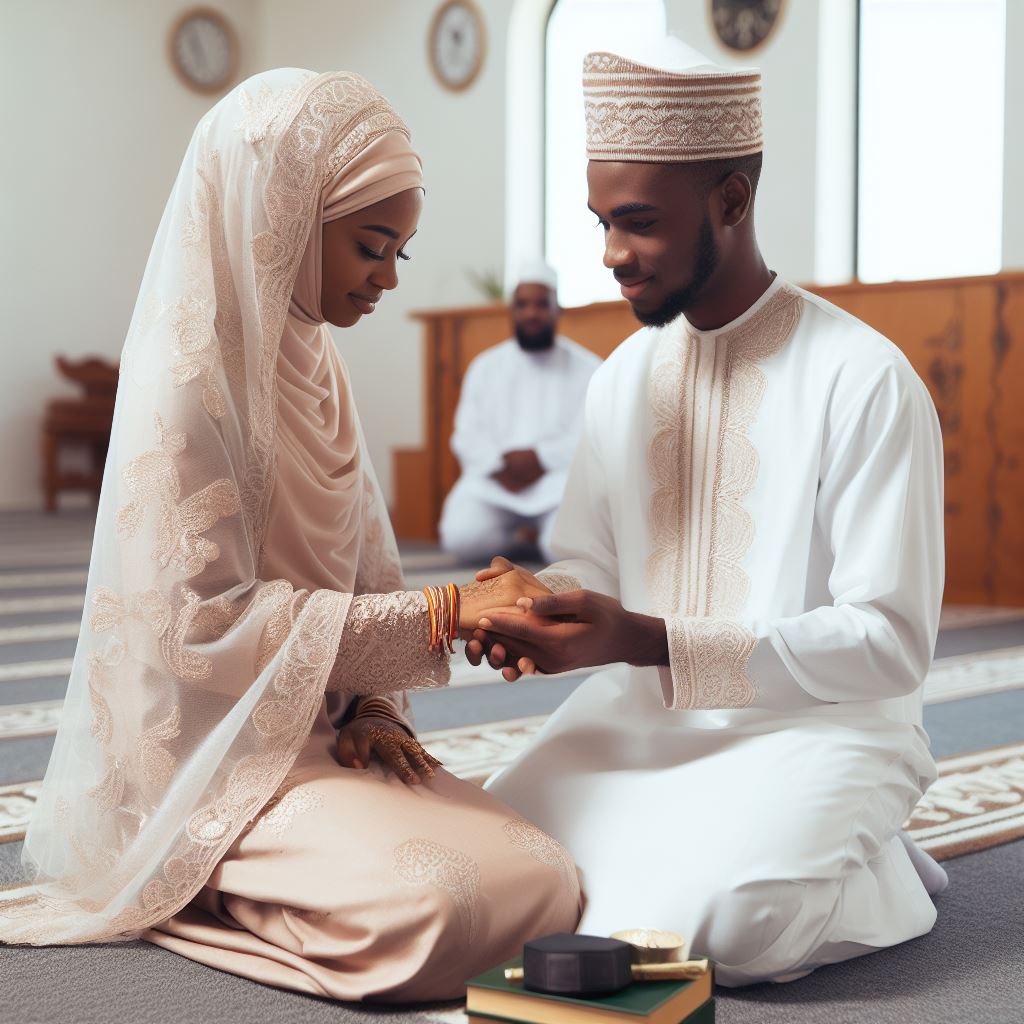Introduction
Walimah, derived from the Arabic word “walama” meaning to mix or blend, is a significant part of Islamic weddings.
It is a celebration where family, friends, and the community come together to share a meal in honor of the newly married couple.
This blog post aims to shed light on the essence of Walimah, its importance, and the customs associated with it.
In Islamic culture, a wedding is considered a sacred and joyous occasion.
One of the core principles of Islam is to establish a strong bond between families and the community, and Walimah serves as a means to foster these connections.
The Prophet Muhammad emphasized the significance of Walimah by personally partaking in wedding feasts and encouraging his followers to do the same.
The primary purpose of this blog post is to educate readers about the religious and social significance of Walimah.
It serves as a platform to discuss various aspects of this tradition such as the recommended timing, the menu, and the etiquette that should be observed during the feast.
By understanding and practicing this Sunnah, Muslims can strengthen their connection with their faith and build stronger bonds within their communities.
Basically, Walimah is an important tradition in Islamic weddings that brings people together to celebrate the union of two individuals.
This blog post aims to explore the significance and customs associated with this celebration, hoping to inspire readers to embrace and preserve this beautiful Sunnah in their own lives.
Historical Background of Walimah
Origin of Walimah in Islamic tradition
- Walimah is a well-established tradition in Islamic culture.
- It has its roots in the practices and teachings of the Prophet Muhammad (pbuh).
- The concept of Walimah is derived from the Arabic word “walam,” meaning to gather or assemble.
- The first Walimah took place during the time of the Prophet Muhammad (pbuh) and his marriage to Zainab bint Jahsh.
Evolution of Walimah over time
- Over time, Walimah has evolved to become an elaborate and joyous celebration.
- Initially, it was a simple feast where family, friends, and the local community gathered to share a meal.
- Today, Walimah has transformed into a grand event with lavish decorations, entertainment, and multiple courses of food.
Significance of Walimah in Arab Culture
- Walimah holds great importance in Arab culture as it symbolizes the union of two families.
- It serves as an opportunity for both families to come together and establish new relationships.
- The event also showcases the generosity of the bride’s family and their willingness to welcome the groom’s family.
Comparison to other wedding traditions
- Walimah differs from other wedding traditions in its focus on communal celebration rather than individual rituals.
- In contrast to Western weddings, which often prioritize the couple, Walimah emphasizes the importance of community involvement.
- Unlike some other cultures, where wedding feasts are held after the wedding, Walimah typically takes place immediately after the marriage ceremony.
By understanding the historical background of Walimah, we can better appreciate its significance in Islamic wedding celebrations.
The tradition originated from the practices of the Prophet Muhammad (pbuh) and has evolved over time into a grand event that brings families and communities together.
In Arab culture, Walimah symbolizes unity and generosity, while also distinguishing itself from other wedding traditions by its emphasis on communal celebration.
Read: Islamic Marital Counseling in Nigeria: Benefits & Places
Components of a Traditional Walimah
Venue selection and decoration
When planning a traditional Walimah, the selection and decoration of the venue play a vital role.
The venue should be spacious enough to accommodate all the guests and provide a comfortable environment.
Decorations should reflect the joyous occasion and can incorporate vibrant colors and traditional Islamic motifs.
Menu planning and food preparation
Menu planning for a Walimah is an important aspect to consider.
The menu should include a variety of dishes, catering to the diverse tastes and preferences of the guests.
Traditional Islamic dishes, such as biryani, kebabs, and baklava, can add an authentic touch to the feast.
Food preparation should be done with utmost care and hygiene, ensuring the highest quality and taste.
Importance of communal dining
Communal dining holds great significance during a Walimah.
It fosters a sense of unity and togetherness among the guests, further enhancing the joyous atmosphere.
Sharing a meal together promotes social interaction and strengthens the bonds between families and friends.
Seating arrangements should be carefully planned to facilitate communication and a lively ambiance.
Dress code and attire for guests
Guests attending a Walimah are expected to dress modestly and adhere to Islamic guidelines.
Men should wear traditional Islamic attire, such as a thobe or a kurta, while women should don modest yet elegant dresses.
It is important to respect the cultural norms and traditions associated with Islamic weddings.
By dressing appropriately, guests show their respect for the occasion and contribute to the overall decorum.
Cultural and entertainment activities during a Walimah
A traditional Walimah often includes cultural and entertainment activities to add excitement and joy.
Live music performances, traditional dance forms, and poetry recitations are common forms of entertainment.
These activities reflect the richness of Islamic culture and provide guests with a memorable experience.
The inclusion of such activities ensures that the celebration is not solely focused on the feast but also on cultural appreciation.
Generally, hosting a traditional Walimah involves several components that contribute to a memorable and joyous celebration.
The venue selection and decoration, menu planning and food preparation, communal dining, dress code and attire for guests, and cultural and entertainment activities all play a significant role in creating a festive atmosphere.
Each of these components helps to uphold the Sunnah and preserve Islamic traditions while celebrating the union of two individuals.
Read: Understanding Talaq: Divorce Laws in Islam for Nigerians
The Sunnah of Walimah
References to Walimah in Islamic teachings
- Walimah is mentioned multiple times in the Islamic teachings as a recommended practice.
- Various verses in the Quran highlight the significance of hospitality and sharing food with others.
- The Hadith also emphasizes the importance of Walimah, encouraging believers to celebrate joyous occasions.
Prophet Muhammad’s example and guidance on Walimah
- Prophet Muhammad himself set an example by hosting a Walimah after his marriage to Hazrat Aisha.
- The Prophet instructed his followers to celebrate weddings with a feast and include others in the happiness.
- His guidance emphasized the inclusive nature of Walimah, urging Muslims to invite family, friends, and the less fortunate.
Blessings and spiritual significance of hosting a Walimah
- Hosting a Walimah is considered a blessed act and a means of seeking Allah’s pleasure.
- It promotes unity and strengthens relationships among families and communities.
- Sharing food and joy with others is seen as an act of gratitude to Allah for the blessings of marriage.
Encouragement for the Muslim community to attend and support Walimah celebrations
- Attending Walimah celebrations is seen as an expression of support for the couple starting their new life.
- It fosters a sense of community and strengthens bonds within the Muslim ummah.
- By participating, Muslims can experience the joy of celebrating love, unity, and the blessings of marriage.
- Supporting Walimahs also helps create a positive environment for new couples in the community.
- It is important for the Muslim community to actively participate in and encourage Walimah celebrations.
Essentially, Walimah holds great significance in Islamic teachings and the example set by Prophet Muhammad.
It serves as a means of sharing blessings, fostering unity, and expressing gratitude to Allah.
By attending and supporting Walimah celebrations,
Muslims can help create a positive environment for new couples and strengthen community relations.
Let us embrace this beautiful tradition, following the Sunnah, and partake in the joyous celebrations of love.
Read: Rights and Responsibilities: Husband-Wife Dynamics in Islam

Planning and Organizing a Memorable Walimah
A walimah, also known as a wedding feast, is a significant event in Islamic culture that brings together family, friends, and loved ones to celebrate the union of two individuals.
It is a time of joy, happiness, and delicious food. In order to create a memorable walimah, careful planning and organization are necessary.
Here are six steps to help you plan and organize a memorable walimah.
Setting a budget and creating a guest list
The first step in planning a walimah is setting a budget.
Determine how much you are willing to spend on the event, including food, venue, decorations, and other expenses.
Once your budget is set, create a guest list to estimate the number of attendees.
Selecting a suitable venue and catering services
Choose a venue that can accommodate the number of guests and aligns with your budget.
Consider factors such as location, parking facilities, and ambiance.
Additionally, select reputable catering services that specialize in Islamic cuisine to ensure the quality and authenticity of the food.
Menu planning and accommodating dietary restrictions
Create a diverse and delicious menu that caters to different tastes and preferences.
Take into consideration dietary restrictions, such as vegetarian, halal, or gluten-free options.
Providing a variety of food options ensures that all attendees can enjoy the feast to the fullest.
Incorporating cultural traditions and customs
Infuse the walimah with cultural traditions and customs to make it a unique and meaningful experience.
This could include traditional music, dances, attire, or rituals that are significant to the couple’s heritage.
Celebrating traditions will add a touch of authenticity to the event.
Ensuring smooth logistics and coordination
To ensure a seamless walimah, pay attention to logistics and coordination.
Coordinate with vendors, decorators, and other service providers beforehand to prevent any last-minute surprises or delays.
Assign a reliable team or coordinator to oversee the event and manage the overall logistics.
Making a memorable impact through thoughtful details and personalization
Pay attention to small details that create a personalized and memorable experience for your guests.
Consider unique decorations, personalized favors, or a photo booth with props.
This will leave a lasting impression on your guests and make your walimah stand out.
Planning and organizing a memorable walimah requires careful attention to detail and thoughtful decision-making.
By following these steps, you can ensure that your walimah becomes a cherished event filled with love, joy, and the spirit of celebration.
Read: The Quran on Marriage: Key Verses for Nigerian Muslims
Contemporary Considerations for Walimah Celebrations
Adapting Walimah to modern times and challenges
- The concept of Walimah can be adapted to fit the needs and challenges of modern times.
- Couples can consider hosting smaller, more intimate Walimah gatherings to comply with social distancing guidelines.
- Technology can be utilized to connect loved ones who are unable to attend the Walimah in person.
Mixing cultural elements and embracing diversity
- Couples from diverse backgrounds can blend cultural elements to create a unique and inclusive Walimah experience.
- Incorporating traditions from both sides of the family can foster a sense of unity and appreciation for different cultures.
- Embracing diversity ensures that the Walimah celebration reflects the couple’s collective identity.
Eco-friendly and sustainable practices during Walimah
- Couples can opt for eco-friendly decor and minimize wastage during the Walimah.
- Choosing a venue that follows sustainable practices, such as recycling and composting, can be a conscious decision.
- Encouraging guests to carpool or use public transportation reduces the carbon footprint of the event.
Balancing tradition with personal preferences
- Modern couples often seek ways to incorporate their personal preferences while respecting traditional aspects of the Walimah.
- Customizing the menu, music, and overall ambiance allows the couple to put their own spin on the celebration.
- Open communication with families and elders can help find a balance between tradition and personalization.
Virtual Walimah options and inclusivity during COVID-19
- In the midst of a pandemic, couples are exploring virtual Walimah options to ensure the safety of their loved ones.
- Online platforms can be used to include distant family members and friends in the celebration.
- Providing interactive activities and sharing pre-recorded speeches or performances can make the virtual Walimah engaging and inclusive.
By considering the modern challenges, embracing diversity, practicing sustainability, finding the right balance between tradition and personalization, and utilizing virtual options, couples can create a memorable and inclusive Walimah celebration.
Conclusion
The Walimah is not just a feast but a beautiful tradition that brings the community together.
It is a celebration of love, unity, and the blessings of marriage.
By gathering our loved ones, sharing delicious food, and expressing gratitude for this sacred union, we strengthen our bonds and continue the Sunnah of our beloved Prophet Muhammad (peace be upon him).
By reflecting on the significance of the Walimah, we understand the importance and beauty behind this tradition.
It serves as a way to honor the union of two individuals and celebrate their commitment in the presence of family and friends.
Therefore, it is essential to encourage couples and families to uphold the Sunnah of Walimah, not only for the sake of tradition but also to forge stronger connections within the community.
By hosting and attending these joyful feasts, we can create a sense of unity, love, and support for one another.
In a nutshell, let us cherish the memories of our own Walimah experiences and aspire to make future celebrations even more meaningful.
May Allah bless every union, showering the couple and their loved ones with abundant joy, barakah, and happiness. Amen.




